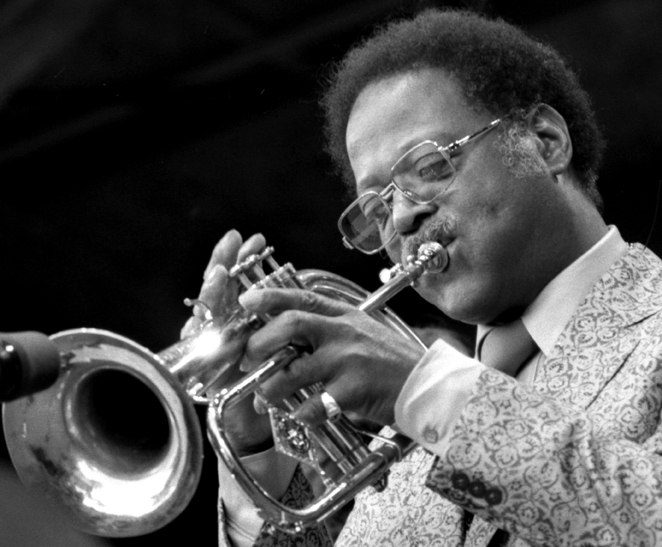
When Dizzy Gillespie said, “The professional is the guy who can do it twice,” he might have been thinking of Clark Terry, whom he once referred to as “the quintessential trumpet player.” Clark had a long and ceaselessly productive life. He was a star sideman in the big band era, a civil-rights pioneer in recording studios, an educator and mentor to generations of musicians, and one of a handful of jazz trumpeters whose playing was so original, virtuosic, and influential as to make him an undisputed legend.
Jazz loves its legends. Many of them are tragic: trumpeters Bix Beiderbecke, Bunny Berigan, Sonny Berman, Clifford Brown, and Booker Little all made their mark but died young. Indeed, the shorthand history of jazz, like that of other arts, is usually presented as a catalog of legends. Often the uninitiated come away having learned only that suffering (rather than, say, study or practice) is the essential ingredient in the making of great art. The tropes are there: an artist is either struggling and misunderstood or visionary and uncompromising, depending. Though jazz writing is full of clichés about tragedy and unfulfilled promise, the sad truth is that too many of those musicians who did not die young came to know financial and health troubles rather than acclaim and stability. In jazz, survival does not mean success.
We understand that Bach and Mozart required patronage to create their works, but jazz stories tend to be told as instances of isolated and spontaneous genius, independent of market forces. From Clint Eastwood’s film Bird to Ken Burns’s Jazz documentary, the giants of jazz are shown as artists in the purest sense, as if all the nourishment they needed was the music they created. But jazz was social music, and they had jobs to do; they worked for others before they became famous and rich. Innovation requires mastery, and for Louis Armstrong, Benny Goodman, and Duke Ellington (to cite the recurring personalities of the Burns documentary), initial success meant simply that they got paid for what they did—which encouraged them to continue. They became professionals before they could become artists.
Clark Terry perfectly exemplified both categories. He was the first postmodern jazz trumpet player. Initially associated with bebop – he was born the same year as Charlie Parker – he became equally well known for his gutbucket blues playing and his incoherent imitation of old-time blues singers. He played and sang the blues in exaggerated quotation marks but also with respect and affection, with a miraculous result that combined caricature and humor with swing and soul. His parody of the blues was the blues. Other soloists in the pantheon, such as Roy Eldridge and Miles Davis, established individual approaches to sound, rhythm, and phrasing, but Clark, alone among his peers, not only achieved his own voice but could maintain it while performing in any context or idiom of jazz.
Jazz soloists are frequently compared to poets, whittling away extraneous notes and leaving only the essential and personal ones. Clark had an instantly identifiable sound and was a nimble and creative improviser, but he also possessed a vocabulary of garrulous stock phrases that were deployed readily and steadily as part and parcel of his musical identity. His deluge of notes could make him sound less like a poet than like a masterly rhetorician, filling the time and the changes with delightful music. The fact that his solos were occasionally predictable and repetitive, with the trademark doodle-tongued ascending scale and the descending arpeggiated triplet figure, stands as a sunny challenge to creative purism: the professionalization of art.
The ideal trumpeter today needs to be able to function in any context; it’s necessary to have a strong identity as a soloist as well as the ability to blend in a section and play historical styles with authority—all while reading music perfectly and playing with clean attacks and precise pitch. Clark exhibited all these skills, and proved that an idiosyncratic artist could also be an anonymous journeyman when required. He played countless sessions as a studio musician in New York, and while the Tonight show band of the 1960s was stacked with the best players in the business, only one of them was a bona fide jazz legend. Wynton Marsalis, significantly, called Clark “my musical daddy.”
With Clark Terry’s passing, we have also lost a firsthand witness to much of the history of the music. There are very few of those left among us these days, but there was only ever one Clark Terry.